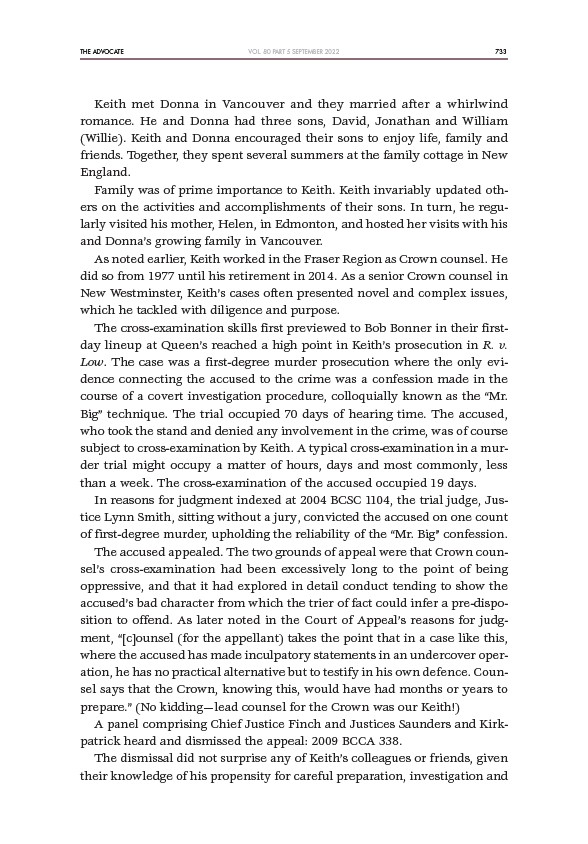
THE ADVOCATE 733
VOL. 80 PART 5 SEPTEMBER 2022
Keith met Donna in Vancouver and they married after a whirlwind
romance. He and Donna had three sons, David, Jonathan and William
(Willie). Keith and Donna encouraged their sons to enjoy life, family and
friends. Together, they spent several summers at the family cottage in New
England.
Family was of prime importance to Keith. Keith invariably updated others
on the activities and accomplishments of their sons. In turn, he regularly
visited his mother, Helen, in Edmonton, and hosted her visits with his
and Donna’s growing family in Vancouver.
As noted earlier, Keith worked in the Fraser Region as Crown counsel. He
did so from 1977 until his retirement in 2014. As a senior Crown counsel in
New Westminster, Keith’s cases often presented novel and complex issues,
which he tackled with diligence and purpose.
The cross-examination skills first previewed to Bob Bonner in their firstday
lineup at Queen’s reached a high point in Keith’s prosecution in R. v.
Low. The case was a first-degree murder prosecution where the only evidence
connecting the accused to the crime was a confession made in the
course of a covert investigation procedure, colloquially known as the “Mr.
Big” technique. The trial occupied 70 days of hearing time. The accused,
who took the stand and denied any involvement in the crime, was of course
subject to cross-examination by Keith. A typical cross-examination in a murder
trial might occupy a matter of hours, days and most commonly, less
than a week. The cross-examination of the accused occupied 19 days.
In reasons for judgment indexed at 2004 BCSC 1104, the trial judge, Justice
Lynn Smith, sitting without a jury, convicted the accused on one count
of first-degree murder, upholding the reliability of the “Mr. Big” confession.
The accused appealed. The two grounds of appeal were that Crown counsel’s
cross-examination had been excessively long to the point of being
oppressive, and that it had explored in detail conduct tending to show the
accused’s bad character from which the trier of fact could infer a pre-disposition
to offend. As later noted in the Court of Appeal’s reasons for judgment,
“counsel (for the appellant) takes the point that in a case like this,
where the accused has made inculpatory statements in an undercover operation,
he has no practical alternative but to testify in his own defence. Counsel
says that the Crown, knowing this, would have had months or years to
prepare.” (No kidding—lead counsel for the Crown was our Keith!)
A panel comprising Chief Justice Finch and Justices Saunders and Kirkpatrick
heard and dismissed the appeal: 2009 BCCA 338.
The dismissal did not surprise any of Keith’s colleagues or friends, given
their knowledge of his propensity for careful preparation, investigation and